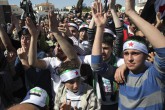In September 2007, Israel carried out an air-strike on a Syrian complex in Deir ez-Zor, which is situated in eastern Syria and borders Iraq. Israeli fighters left a large hole in this complex which was later declared to be a nuclear facility. Following this, both Israel and Syria fell silent. It was later discovered that Mossad was involved in spying activities. Israeli commandos arrived at the site before the airstrike so that they could highlight the target with laser beams. Israeli fighters violated Syrian airspace and bombed the site then returned back to their country. Rather than questioning whether or not this site was a nuclear facility, one must ask whether the silence of the Syrian regime against Israeli airstrike is a confession of guilt or an indication that the regime acted based on Middle Eastern politics. To be more precise, did Syria fall silent given the panic that its nuclear facilities were revealed or did Israel’s “deterrent” force cause this silence?
Last week, Syria shot down unarmed Turkish Air Force F4—which was on a test mission—on international waters, initiating a new process. It is necessary to consider the above-mentioned questions once again in this new process. Syria talked about the sacredness of the air space just like Nuri al-Maliki who told that “Turkey violates the sovereignty of Iraq in Washington” and even stated that they targeted the Turkish fighter because they mistook it for an Israeli one. It is therefore necessary to analyze the relation between Israel and Syria which can also be considered an “arranged tension” by those closely following the issue.
Damascus perception of Tel Aviv
Here one must look at how Damascus perceives Tel Aviv and how Tel Aviv views Damascus.
The Damascus perception of Tel Aviv has two sides: an official, explicit one and an unofficial implicit one. Damascus explicitly perceives Israel as a country which occupies Golan, and persecutes Palestinians and which therefore should be destroyed. This perception is one of the cornerstones of Syrian foreign policy.
Syria gains legitimacy through the Palestinian issue and contrived Israeli-phobia and presents itself as the opposite of Egypt—which took the side of “Camp Israel” in Camp David—and as the Arab patron of the resistance circle. In line with this perception, Syria was hosting cadres of Hamas leaders and it still serves as a stepping stone between Hezbollah—over which it increased its influence following the Syrian occupation of Lebanon—and Iran.
The implicit Damascus perception, on the other hand, indicates the “conceded helplessness” against Israel which defeats Syria at every turn. Syria has such a perception because it knows Israel’s military power in the region and the things its patron, namely U.S., is ready to do for Israel. Syria kept its silence about Golan—which Israel has been occupying since 1967 and which it annexed unlike other territories it occupied such as West Bank, East Jerusalem and Gaza—as it was the case after the Syrian complex was bombed in Deir ez-Zor. This is the indication of this implicit perception. The Syrian regime does not want to “throw the baby out with the bathwater”. In other words it does not want to risk facing opposition of Israel and U.S. because of Golan.
Conceded helplesness
Golan is not a symbol of the “resistance rhetoric” of Syria but a symbol of its helplessness against Israel. It is interesting that the 4th Armored Division under the command of Maher al-Assad—which is supposed to protect Golan—has ensured Israel’s security until now while Syria used the activism it is expected to use against Israel in order to suppress Syrian people in opposition. The Syrian regime—which assumed a great role in smuggling foreign warriors in Iraq—is famous for its harsh reactions and torture methods against those who try to infiltrate Golan and I
In this article
- Foreign Policy
- Opinion
- 1967
- 2007
- Al Quds
- Assad Regime
- Bashar Al Assad
- camp david
- East Jerusalem
- Egypt
- Gaza
- Golan Heights
- Hamas
- Hezbollah
- Iraq
- Islamic Republic of Iran
- Israel
- Israel-Palestine Conflict
- Jerusalem
- Lebanon
- Middle East
- MOSSAD | Israeli Institute for Intelligence and Special Operations
- Opposition
- Palestine
- Syria
- Syrian Civil War
- Syrian Conflict
- Syrian Crisis
- Syrian Regime
- Tel Aviv
- United States (US)
- West Bank

